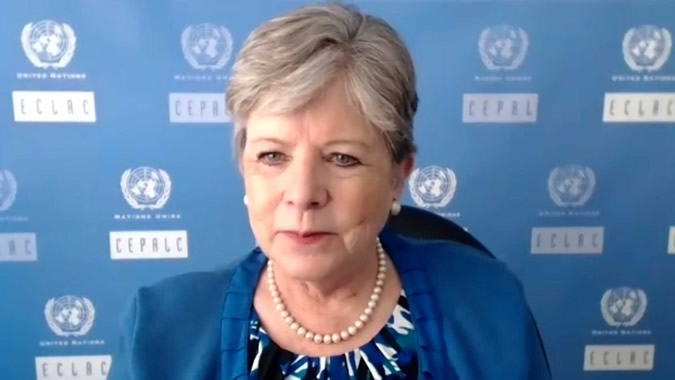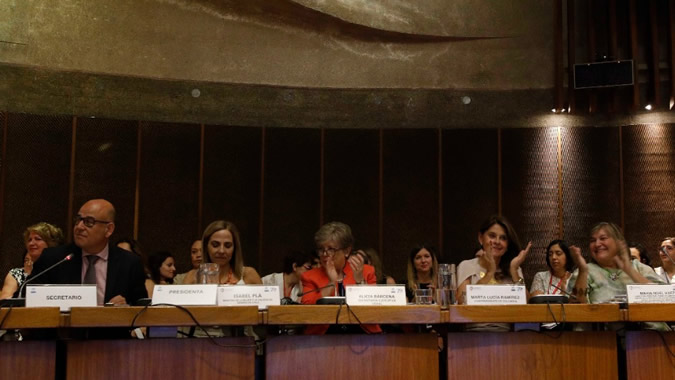It is Necessary to Incorporate the Gender Dimension into Fiscal Policies amid the Pandemic and the Care Economy into a Transformative Recovery: Alicia Bárcena
Work area(s)
ECLAC’s Executive Secretary participated in a web seminar organized by the Women Lead program of Johns Hopkins University’s School of Advanced International Studies, based in the United States.

Alicia Bárcena, Executive Secretary of the Economic Commission for Latin America and the Caribbean (ECLAC), today posed the urgency of implementing active fiscal policies with a gender approach in the short term to mitigate the disproportionate effects of the COVID-19 pandemic on women, while also forging a political compact at all levels based on feminist principles of redistribution of power, time, work and resources, to move towards a development model that has equality and environmental sustainability at the center.
Bárcena participated in a web seminar entitled “Gendering the Post-Pandemic Global Economic Recovery: A Paradigm Change,” organized by the Women Lead program (SWL) of the School of Advanced International Studies (SAIS) of Johns Hopkins University in the United States. She was joined by Nancy Folbre, professor and feminist economist, and Anita Bhatia, Deputy Executive Director of UN Women, as well as Chiedo Nwankwor, Director of SWL, who served as the moderator.
Gender inequality in Latin America and the Caribbean has been exacerbated by the pandemic, since women in the region have been more affected by the increase in unemployment and poverty and by the greater burden of unpaid domestic and care work, Bárcena said in her remarks.
ECLAC forecasts that 231 million people will slide into poverty in 2020 in Latin America, of whom 118 million will be women. In addition, 21 million women will be unemployed, and one out of every two will work in the informal sector, meaning without social protection, the senior official indicated.
In Latin America and the Caribbean, women have more years of schooling than men, on average (10.3 versus 9.8 in the population between 18 and 24 years of age); however, their labor participation rate is just 51.3% versus 74% of men, the Executive Secretary noted.
Concrete budgetary allotments are needed, Bárcena said, to protect women’s employment, both in the formal and informal sectors; to promote their full participation in production and in the benefits of the digital revolution; to close the gap in access to financing by providing credits and insurance; to eliminate gender violence and ensure their sexual and reproductive rights; and to expand care services, both public and private ones, with adequate pay and social protection.
Investing in the care economy – work that must be seen as a public good – is key to achieving a sustainable recovery in the medium and long term, Bárcena emphasized, highlighting the examples of Argentina and Uruguay as countries with national care systems that would be worth deepening and strengthening.
More immediately, ECLAC has created the COVID-19 Observatory in Latin America and the Caribbean to identify the measures implemented by countries in response to the crisis unleashed by the pandemic, including those related to gender equality, Bárcena stated.
In addition, the region has the Santiago Commitment – approved at the XIV Regional Conference on Women in Latin America and the Caribbean, organized by ECLAC and UN Women in January of this year – which should become the guide for implementing comprehensive policies for reactivation and economic transformation, with specific proposals on matters of macroeconomics, trade and the care economy and in the area of science, technology, engineering and mathematics.
“A recovery and economic transformation with gender equality at the center must acknowledge and redistribute power, time, work and resources. We need to break the statistical silence and empower women along the three dimensions of their autonomy (economic, physical and political) through a political compact at a national and regional level,” stressed ECLAC’s Executive Secretary, who called for guaranteeing women’s participation in all sectors of society at the highest level. “The transformation has to be feminist, or it will not be at all.”
Related content

Latin American and Caribbean Countries Approved the Santiago Commitment, Which Seeks to Accelerate Efforts to Fulfill the Regional Gender Agenda
The XIV Regional Conference on Women in Latin America and the Caribbean, organized by ECLAC with support from UN Women, concluded today in Chile.
Related link(s)
Country(ies)
- Latin America and the Caribbean
Contact
Public Information Unit
- prensa@cepal.org
- (56 2) 2210 2040
